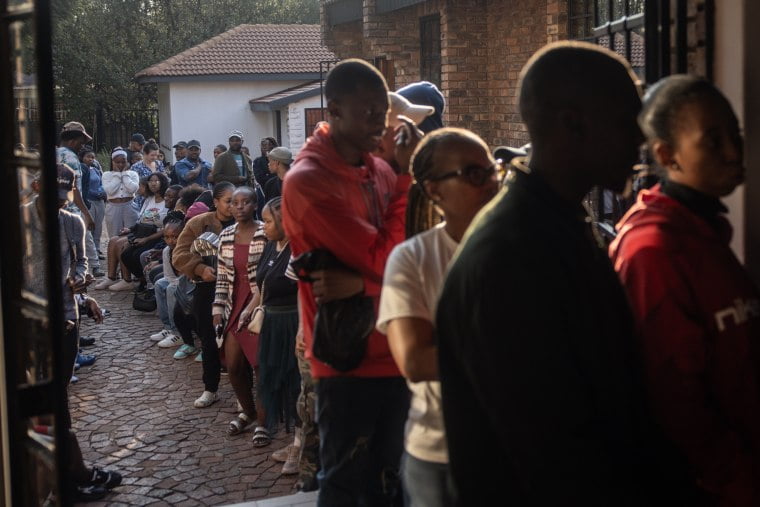After a sharp decline in popularity, the once-dominant African National Congress had garnered just over 40% of the vote with more than 99% of the votes recorded on Wednesday.
In Short
- Event: South africa election 2024 results.
- Outcome: Anc loses parliamentary majority for the first time since 1994.
- Details: Anc garners just over 40% of the vote with over 99% of ballots counted.
- Implications: Likely coalition government needed to re-elect president cyril ramaphosa.
- Significance: Marks a historic political shift and potential new alliances.
TFD – In a landmark shift, the African National Congress (ANC) has lost its parliamentary majority in the 2024 South Africa election, marking a significant political change. With just over 40% of the vote, the ANC’s three-decade dominance has ended, paving the way for potential coalition governments and a new era in South African politics.

Johannesburg — In a historic election result on Saturday, the African National Congress party lost its parliamentary majority, setting South Africa on a new political trajectory for the first time since the 30 years ago end of the apartheid system of white minority rule.
The once-dominant ANC had garnered just over 40% of the vote on Wednesday, well shy of the majority it had held since the historic all-race vote of 1994 that brought it to power under Nelson Mandela and ended apartheid. More than 99% of the ballots had been tabulated as of this writing. The independent electoral commission that conducted the election has not yet officially announced the final results, but the ANC is unable to receive 50% of the vote.
The commission stated at the beginning of the election that the results will be officially announced by Sunday, although that might happen sooner.
The African National Congress (ANC) managed to hold onto its majority, despite opposition parties hailing the outcome as a historic turning point for a nation beset by extreme poverty and inequality. It will now, however, probably have to find a coalition partner or partners in order to stay in power and re-elect President Cyril Ramaphosa for a final and second term. Following national elections, Parliament chooses the president of South Africa.
“We have broken the ANC’s majority, which is the only way to save South Africa,” declared prominent opposition leader John Steenhuisen.
For the most developed economy in Africa, the road ahead looks difficult, and a coalition is not yet on the table.
The Democratic Alliance party led by Steenhuisen received about 21% of the vote. In its first election, the former president Jacob Zuma’s MK Party, which he now leads against the ANC, finished third with slightly more than 14% of the vote. At slightly over 9%, the Economic Freedom Fighters ranked fourth.
With its relatively small proportion of the vote, the DA and MK seem to be the most apparent candidates for the ANC to approach, especially considering how far away they are from a majority. Over 50 parties ran in the election. Given that Parliament must convene and pick a president within 14 days of the formal announcement of the final election results, the ANC’s choice of coalition is currently the urgent focus. A flurry of negotiations are set to take place and they will likely be complicated.
According to Steenhuisen, talks are welcome inside his centrist party. The MK Party stated that the removal of Ramaphosa as the president and head of the ANC was one of their requirements for any accord. That highlighted the intense political rivalry between Ramaphosa, the new president of South Africa, and Zuma, who resigned from office in 2018 after charges of corruption.
MK Party spokesperson Nhlamulo Ndlela stated, “We are willing to negotiate with the ANC, but not the ANC of Cyril Ramaphosa.”
MK and the extreme left Economic Freedom Fighters have advocated for nationalizing portions of the economy. Analysts claim that an ANC-DA combination would attract more foreign investment because the Democratic Alliance is seen as a business-friendly party. However, there are doubts about the coalition’s electoral viability given that the DA has long been the most vocal opposition party.
A marriage of two drunk people in Las Vegas” is how the ANC-DA coalition describes itself. The leader of the tiny Patriotic Alliance party, Gayton McKenzie, told South African media that “it will never work.”
Opposition parties in South Africa, a nation of 62 million people and the most prosperous in Africa but also one of the most unequal in the world, welcomed the new political landscape despite the uncertainty.
The African National Congress (ANC) has failed to improve millions of people’s standard of living in South Africa, a country marked by excessive unemployment and pervasive poverty. Black people, who make up 80% of the population and have long formed the backbone of the ANC’s support, are disproportionately affected by poverty, and the official unemployment rate is 32%, among the highest in the world.
Voters have also punished the ANC for a basic government service failure that affects millions of people and leaves many without access to electricity, water, or decent housing.
According to data from the independent electoral commission, around 28 million South Africans were registered to vote, and approximately 60% of those voters are anticipated to cast ballots.
Conclusion
The 2024 South Africa election marks a historic turning point, with the ANC losing its parliamentary majority for the first time since the end of apartheid. This significant political shift could lead to new coalitions and a reshaped political landscape in South Africa. As the nation navigates these changes, the emphasis on maintaining stability and addressing pressing social issues remains paramount. The outcome underscores the dynamic and evolving nature of South African democracy, setting the stage for future political developments.
Connect with us for the Latest, Current, and Breaking News news updates and videos from thefoxdaily.com. The most recent news in the United States, around the world , in business, opinion, technology, politics, and sports, follow Thefoxdaily on X, Facebook, and Instagram .